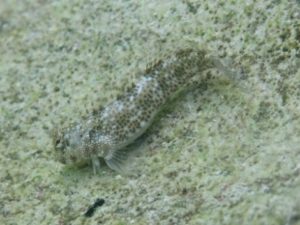
A new study carried out by a team of researchers from Australia suggests that four species of blennies fish on the South Pacific island of Rarotonga have developed the ability to survive out of water to escape predators in the ocean.
This study was carried out by researchers from the University of South Wales (UNSW) and the Australian National University.
“On the island of Rarotonga, several blenny fish species appear to be in the process of colonizing land. Anecdotal observations have implied that aquatic predation is an important factor in prompting such amphibious fish behavior. We provide evidence supporting this hypothesis by demonstrating that amphibious blennies shift their abundance up and down the shoreline to remain above predatory fishes that periodically move into intertidal areas during high tide,” the study authors say in a paper.
“A predation experiment using blenny mimics confirmed a high risk of aquatic predation for blennies, significantly higher than predation experienced on land. These data suggest that predation has played an active role in promoting terrestrial activity in amphibious blennies and provide a rare example of how ecological release from predation could drive the colonization of a novel environment,” the authors added.
Rarotonga is the largest of the Cook Islands in the South Pacific Ocean, and provides ample opportunities to researchers to study fish evolution in action. Four species of blennies can be seen here spending their time on land from time to time.

Scientists studied three of the four amphibious species on Rarotonga. These fish spend their time on land, in the water, and the rock shelf in the intertidal zone. During low tide, these creatures swim in coastal rock pools, but move further up on land at the time of high tide.
“Avoiding predators might be an explanation of why some animals move from their ancestral homes into starkly different environments, but evidence for this is rare because it is difficult to collect,” says researcher and evolutionary ecologist Dr Terry Ord of UNSW in Sydney.
“Our study of blennies on Rarotonga is the first to examine the pressures driving fish out of the water. There obviously have to be some major benefits for fish to make the dramatic shift onto land. Otherwise, why would they do it?”
“It turns out the aquatic environment is a nasty place for blennies, full of enemies wanting to eat these small fish. But life is less hostile on the rocks, with birds their main worry,” he says.
“At low tide most of the blennies were on the rock shelf in the intertidal zone. Those remaining in the water actively avoided areas where there were predators, such as flounders, trevallies, wrasses and moray eels,” says Dr Ord.
“As the tide came in and the rock shelf became submerged, most of the blennies moved to higher ground, above the high tide mark, apparently to avoid being eaten by the aquatic predators coming in with the rising water.”
The detailed findings of the study have been published in The American Naturalist.
